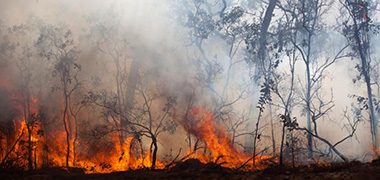
How do I become a conservation scientist?
Bachelor of Environmental Science
- There are no mandated entry requirements.








Bachelor of Science (Marine Biology)
- There are no mandated entry requirements.





Bachelor of Science (Ecology and Conservation Biology)
- There are no mandated entry requirements.



Bachelor of Science (Geography)
- There are no mandated entry requirements.








Bachelor of Science (Honours) (Ecology)
- There are no mandated entry requirements.


Bachelor of Science (Honours) (Zoology)
- There are no mandated entry requirements.


Related occupations
Conservation Manager
A Conservation Manager protects environmental areas from degradation, focusing on wildlife and resource preservation while liaising with stakeholders.
Environmental Officer
An Environmental Officer ensures sustainability in an organisation by implementing practices that meet environmental standards and policies.
Sustainability Officer
Sustainability Officers help organisations lower emissions and carbon footprints by developing sustainability plans and ensuring ethical sourcing.
Environmental Consultant
An Environmental Consultant advises businesses and government on environmental issues, conducting audits and assessments to improve practices and ensure compliance.
Conservation Trainee
Conservation Trainees assist in environmental projects while training, requiring passion for nature, teamwork, and ability to work outdoors.
Ecologist
An Ecologist studies ecosystems and biodiversity, conducts field surveys, analyses data, develops conservation plans, and advises on sustainability.
Environmental Manager
An Environmental Manager ensures compliance and sustainability in organisations by developing systems, conducting audits, and training staff.
Environmental Specialist
An Environmental Specialist collaborates with stakeholders to protect ecosystems, conducts impact assessments, and advises on development projects.
Conservation Officer
Conservation Officers create and manage initiatives to safeguard the environment and natural resources through community engagement and fieldwork.
Field Assistant
Field Assistants aid conservation professionals in various outdoor fieldwork tasks, including data collection and maintenance of access trails.
Environmental Educator
An Environmental Educator teaches communities about sustainability and environmental issues through workshops and curriculum development.
Environmental Advocate
An Environmental Advocate raises awareness of environmental issues through advocacy, outreach, and community engagement for positive change.
Sustainability Consultant
A Sustainability Consultant advises organisations on sustainable practices, conducts assessments, and develops strategies for resource efficiency.
Natural Resource Manager
A Natural Resource Manager creates strategies to manage and conserve resources, ensuring compliance and collaborating to protect biodiversity.
Environmental Economist
An Environmental Economist analyses the economic impacts of environmental policies, focusing on data analysis and sustainability to inform decision-making.
Geographer
A Geographer analyses Earth's features, studies human-environment interactions, conducts fieldwork, and supports urban planning and conservation efforts.
Conservation Researcher
Conservation Researchers study ecosystems and wildlife to inform conservation efforts, requiring strong analytical skills and a passion for the environment.
Environmental Assessor
An Environmental Assessor evaluates project impacts on the environment, ensuring regulatory compliance through data collection and analysis.
Geomorphologist
A Geomorphologist studies landform evolution, conducts surveys, analyses geological data, and advises on sustainable land use and conservation projects.
Climate Change Consultant
A Climate Change Consultant advises on sustainability strategies, focusing on mitigation and compliance through research and analysis.
Climate Scientist
A Climate Scientist analyses climate data and models patterns to understand and address climate change, collaborating with various stakeholders to inform policy.
Conservationist
A Conservationist protects natural habitats and wildlife, conducts research, and advocates for sustainable practices to maintain biodiversity.
Environmental Planner
An Environmental Planner evaluates land use and development projects to ensure compliance with environmental regulations and promote sustainability.
Environmental Advisor
Environmental Advisors guide organisations on environmental policies, ensuring compliance and promoting sustainability while assessing impacts and implementing eco-friendly practices.
Sustainability Specialist
A Sustainability Specialist promotes eco-friendly practices, improves resource efficiency, and drives compliance within various organisations.
Ecology Consultant
An Ecology Consultant provides expert ecological advice, conducts environmental assessments, and develops strategies for natural resource management.
Environmental Project Manager
An Environmental Project Manager oversees projects focused on environmental protection and sustainability, managing budgets, timelines, and stakeholder relations.
Forestry Manager
A Forestry Manager oversees sustainable forest management, planning operations, engaging stakeholders, managing budgets, and ensuring compliance with regulations.
Sustainability Manager
A Sustainability Manager implements eco-friendly initiatives, develops strategies for reducing impact, and promotes sustainability across the organisation.
Water Resource Engineer
A Water Resource Engineer designs and manages systems for sustainable water use, ensuring efficient distribution, compliance with regulations, and environmental conservation.
Water Engineer
A Water Engineer designs and manages water systems, ensuring their safe, efficient, and sustainable use to meet community needs.
Ocean Engineer
An Ocean Engineer designs technology for marine environments, ensuring safety and sustainability in offshore platforms and underwater systems.
GIS Specialist
A GIS Specialist analyses spatial data to create maps and models, supporting decision-making in fields like urban planning and environmental management.
Environmental Policy Analyst
An Environmental Policy Analyst researches and develops policies to enhance environmental quality, ensuring effective and sustainable solutions.
Environmental Compliance Officer
Environmental Compliance Officers ensure organisations follow environmental laws by monitoring compliance, conducting inspections, and advising on best practices.
Environmental Technician
An Environmental Technician monitors and analyses environmental conditions, ensuring compliance with regulations and supporting conservation efforts.
Further reading


What can you do with a Certificate IV in Environmental Management and Sustainability?
27th October 2020)
